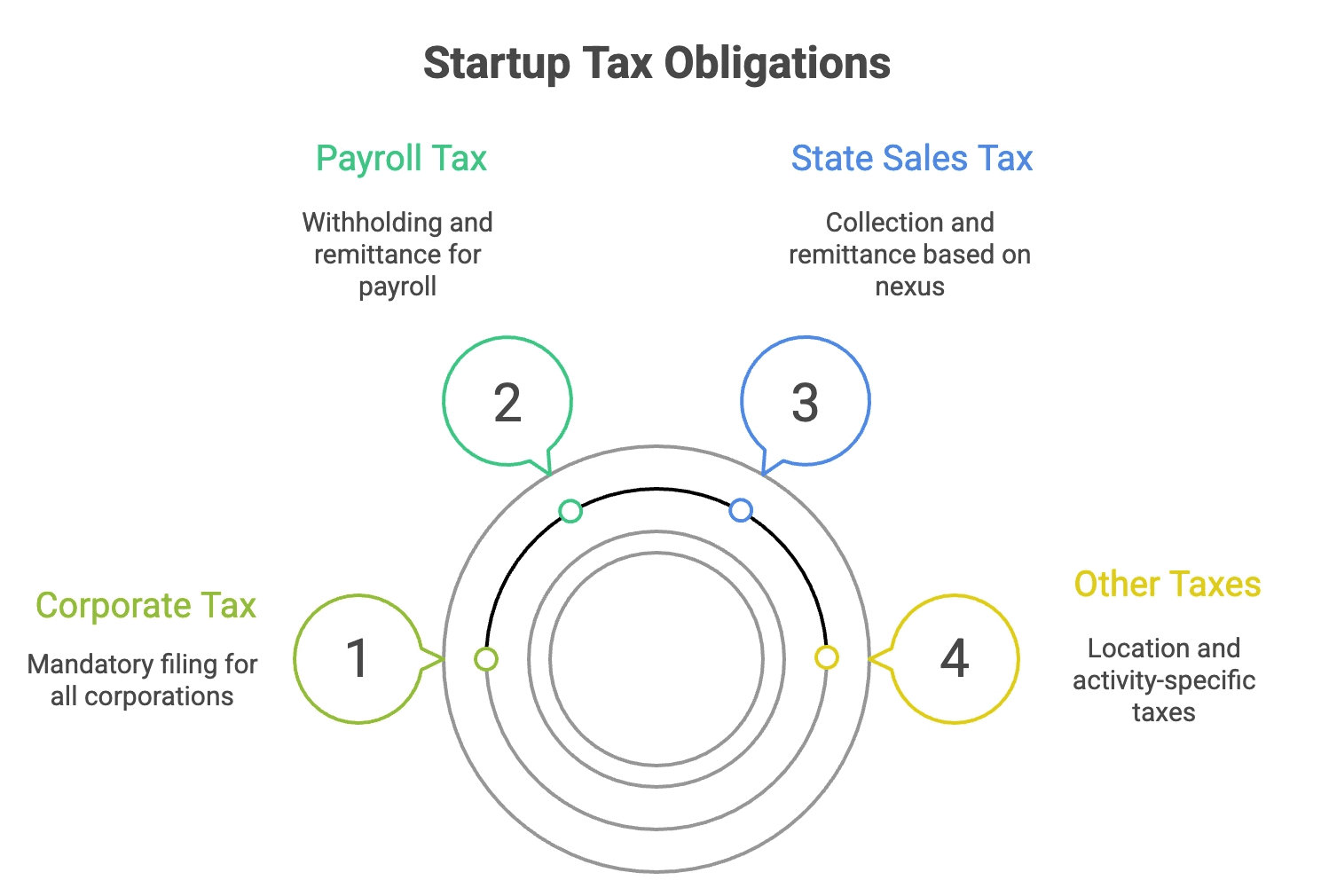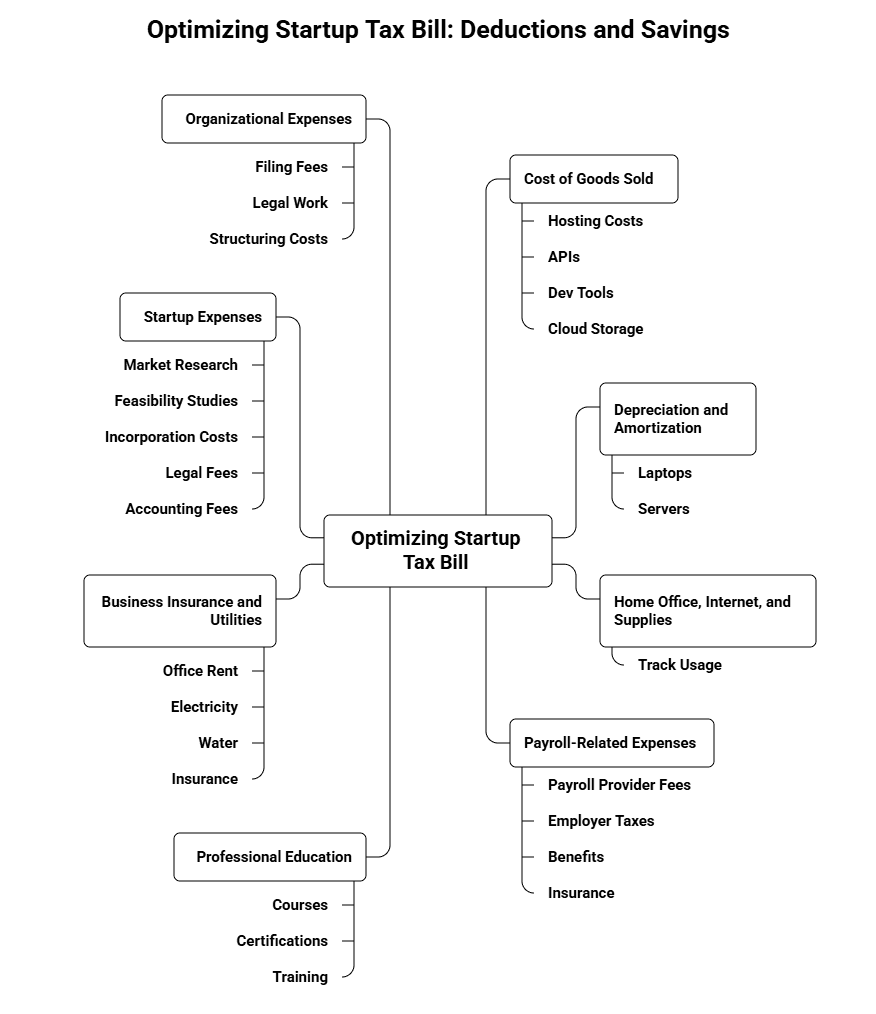Go Back
Last Updated :
Last Updated :
Nov 24, 2025
Nov 24, 2025



A Step-by-Step Guide on How to Do Business Taxes for Startups
Tax season hits harder for founders. Between entity choices, quarterly deadlines, payroll obligations, and state-by-state rules, taxes can quickly turn into a time sink that pulls you away from product and customers.
This guide shows you how to do business taxes the right way—clear steps, direct explanations, and startup-specific tactics to keep your burn rate clean and your filings compliant.
Understanding Different Types of Entities
Your legal structure drives how you’re taxed, what forms you file, and how investors evaluate you. Most startups choose between five options: sole proprietorship, partnership, LLC, S-Corp, and C-Corp.
Sole Proprietorship: Simple, but Not Scalable
If you’re freelancing or building prototypes solo, a sole proprietorship works temporarily. There’s no formal setup and no corporate tax. But you’re personally liable, fundraising is nearly impossible, and separating business vs. personal finances becomes messy.
General Partnership: Built for Early Experiments, Not Growth
Two or more founders can operate as a partnership without forming a separate entity. Variants include LPs and LLPs. They’re fine for testing ideas but break down fast under liability, hiring, and fundraising demands.
LLC: Flexible and Founder-Friendly (Until Investors Enter)
LLCs offer liability protection and tax flexibility. They’re ideal for bootstrapped or lifestyle businesses. But VCs rarely invest in LLCs. Equity issuance is harder, tax flows complicate cap tables, and you’ll likely convert to a C-Corp anyway.
S-Corp: Tax-Friendly, Operationally Restrictive
S-Corps avoid corporate tax, but founders face major constraints:
One class of stock
Max 100 shareholders
Only U.S. individuals can own shares
This makes S-Corps a mismatch for venture-backed tech.
C-Corp: The Default for Startups
If your goal is raising capital, issuing equity, and scaling, form a C-Corp—typically in Delaware. Benefits include:
Multiple stock classes
No shareholder limit
Clean equity compensation
Familiar structure for VCs and legal teams
Changing structures later is possible, but creates friction. Start with the right foundation.
Your Business’s Tax Liability
All for-profit U.S. businesses owe taxes, but your rate and filing obligations depend on your entity’s tax election.
C-Corps vs. Pass-Through Entities
C-Corps: File Form 1120. Subject to the 21% federal corporate rate.
Pass-through entities: (LLCs, partnerships, sole proprietorships, S-Corps) Income flows to your personal return. You’ll file forms like 1065 or 1120-S, depending on the structure.
Federal Tax Changes
Congress must approve any tax code updates. Many TCJA provisions expire at the end of 2025, but the corporate tax at 21% is permanent unless changed by new legislation.
Key Tax Categories for Startups

Corporate Tax: All corporations must file Form 1120—even with zero profit.
Payroll Tax: If you run payroll, you must withhold:
Federal income tax
Social Security
Medicare
Federal unemployment (FUTA)
Missing payroll taxes is one of the fastest ways to trigger penalties.
State Sales Tax: You must collect and remit sales tax in states where you’ve established nexus—via physical presence, employees, or sales thresholds.
Other Taxes: Depending on location and activities, you may also owe:
Property tax
Excise tax
Franchise tax
Use tax
When Are Business Taxes Due?
Startups must pay taxes throughout the year. Federal estimated payments for calendar-year entities are due:
April 15
June 15
September 15
January 15
Fiscal-Year Businesses
If you operate on a fiscal year, your deadlines shift based on your start date.
Key Tax Deadlines for 2025
January 15, 2025: Q4 estimated payment
March 15, 2025: Partnership, multi-member LLC, and S-Corp returns (Forms 1065, 1120-S)
April 15, 2025: C-Corp returns (Form 1120) and individual returns
How to Optimize Your Startup's Tax Bill
Tech startups can deduct more than founders realize. Here’s where savings (and runway) come from.
Cost of Goods Sold (COGS)
Deduct expenses directly tied to building your product:
Hosting costs
APIs
Dev tools
Cloud storage
Depreciation and Amortization
Large purchases like laptops and servers may be deducted over time.
Home Office, Internet, and Supplies
Remote work creates legitimate deductions—as long as you track usage.
Payroll-Related Expenses
Payroll provider fees, employer taxes, benefits, and insurance are deductible.
Professional Education
Courses, certifications, and training tied to your business qualify.
Business Insurance and Utilities
Office rent, electricity, water, and insurance are all valid deductions.
Startup Expenses (First-Year Deductions)
You can deduct up to $5,000 of eligible startup costs if total startup expenses are under $50,000. This includes:
Market research
Feasibility studies
Incorporation costs
Early legal and accounting fees
Organizational Expenses
Forming a C-Corp or LLC? Filing fees, legal work, and structuring costs may be deductible.

Use the R&D Tax Credit (Most Tech Startups Qualify)
You can often claim the R&D tax credit, even if you’re pre-revenue. You may qualify if you’re:
Building new software
Improving an existing system
Developing algorithms
Conducting product testing
You must meet the four-part IRS test:
Permitted purpose
Technological in nature
Uncertainty at outset
Experimentation process
Startups can claim up to $500,000 in credits. You’ll file:
Form 6765 (partnerships, S-Corps)
Form 3800 (C-Corps)
Stay Organized and Work With a Startup CPA
Clean books are the foundation of a low tax bill. Keep:
Consistent accounting records
Receipts (digital or physical)
Categorized expenses
A CPA fluent in startups and software accounting will help you:
Capture all deductions
File the right federal and state forms
Model your next year’s tax liability
Tax planning isn’t a March activity—it’s a year-round strategy.
Haven: Financial Ops for Startups, Handled
Let your business take flight while Haven manages your financial runway. Built by founders for founders, we handle daily bookkeeping, tax filings, payroll, and R&D credits—plus fractional CFO support.
More than 400 startups rely on Haven to stay compliant, save hours each month, and avoid costly filing mistakes.
Book a call and get financial ops that move as fast as you do.
Tax season hits harder for founders. Between entity choices, quarterly deadlines, payroll obligations, and state-by-state rules, taxes can quickly turn into a time sink that pulls you away from product and customers.
This guide shows you how to do business taxes the right way—clear steps, direct explanations, and startup-specific tactics to keep your burn rate clean and your filings compliant.
Understanding Different Types of Entities
Your legal structure drives how you’re taxed, what forms you file, and how investors evaluate you. Most startups choose between five options: sole proprietorship, partnership, LLC, S-Corp, and C-Corp.
Sole Proprietorship: Simple, but Not Scalable
If you’re freelancing or building prototypes solo, a sole proprietorship works temporarily. There’s no formal setup and no corporate tax. But you’re personally liable, fundraising is nearly impossible, and separating business vs. personal finances becomes messy.
General Partnership: Built for Early Experiments, Not Growth
Two or more founders can operate as a partnership without forming a separate entity. Variants include LPs and LLPs. They’re fine for testing ideas but break down fast under liability, hiring, and fundraising demands.
LLC: Flexible and Founder-Friendly (Until Investors Enter)
LLCs offer liability protection and tax flexibility. They’re ideal for bootstrapped or lifestyle businesses. But VCs rarely invest in LLCs. Equity issuance is harder, tax flows complicate cap tables, and you’ll likely convert to a C-Corp anyway.
S-Corp: Tax-Friendly, Operationally Restrictive
S-Corps avoid corporate tax, but founders face major constraints:
One class of stock
Max 100 shareholders
Only U.S. individuals can own shares
This makes S-Corps a mismatch for venture-backed tech.
C-Corp: The Default for Startups
If your goal is raising capital, issuing equity, and scaling, form a C-Corp—typically in Delaware. Benefits include:
Multiple stock classes
No shareholder limit
Clean equity compensation
Familiar structure for VCs and legal teams
Changing structures later is possible, but creates friction. Start with the right foundation.
Your Business’s Tax Liability
All for-profit U.S. businesses owe taxes, but your rate and filing obligations depend on your entity’s tax election.
C-Corps vs. Pass-Through Entities
C-Corps: File Form 1120. Subject to the 21% federal corporate rate.
Pass-through entities: (LLCs, partnerships, sole proprietorships, S-Corps) Income flows to your personal return. You’ll file forms like 1065 or 1120-S, depending on the structure.
Federal Tax Changes
Congress must approve any tax code updates. Many TCJA provisions expire at the end of 2025, but the corporate tax at 21% is permanent unless changed by new legislation.
Key Tax Categories for Startups

Corporate Tax: All corporations must file Form 1120—even with zero profit.
Payroll Tax: If you run payroll, you must withhold:
Federal income tax
Social Security
Medicare
Federal unemployment (FUTA)
Missing payroll taxes is one of the fastest ways to trigger penalties.
State Sales Tax: You must collect and remit sales tax in states where you’ve established nexus—via physical presence, employees, or sales thresholds.
Other Taxes: Depending on location and activities, you may also owe:
Property tax
Excise tax
Franchise tax
Use tax
When Are Business Taxes Due?
Startups must pay taxes throughout the year. Federal estimated payments for calendar-year entities are due:
April 15
June 15
September 15
January 15
Fiscal-Year Businesses
If you operate on a fiscal year, your deadlines shift based on your start date.
Key Tax Deadlines for 2025
January 15, 2025: Q4 estimated payment
March 15, 2025: Partnership, multi-member LLC, and S-Corp returns (Forms 1065, 1120-S)
April 15, 2025: C-Corp returns (Form 1120) and individual returns
How to Optimize Your Startup's Tax Bill
Tech startups can deduct more than founders realize. Here’s where savings (and runway) come from.
Cost of Goods Sold (COGS)
Deduct expenses directly tied to building your product:
Hosting costs
APIs
Dev tools
Cloud storage
Depreciation and Amortization
Large purchases like laptops and servers may be deducted over time.
Home Office, Internet, and Supplies
Remote work creates legitimate deductions—as long as you track usage.
Payroll-Related Expenses
Payroll provider fees, employer taxes, benefits, and insurance are deductible.
Professional Education
Courses, certifications, and training tied to your business qualify.
Business Insurance and Utilities
Office rent, electricity, water, and insurance are all valid deductions.
Startup Expenses (First-Year Deductions)
You can deduct up to $5,000 of eligible startup costs if total startup expenses are under $50,000. This includes:
Market research
Feasibility studies
Incorporation costs
Early legal and accounting fees
Organizational Expenses
Forming a C-Corp or LLC? Filing fees, legal work, and structuring costs may be deductible.

Use the R&D Tax Credit (Most Tech Startups Qualify)
You can often claim the R&D tax credit, even if you’re pre-revenue. You may qualify if you’re:
Building new software
Improving an existing system
Developing algorithms
Conducting product testing
You must meet the four-part IRS test:
Permitted purpose
Technological in nature
Uncertainty at outset
Experimentation process
Startups can claim up to $500,000 in credits. You’ll file:
Form 6765 (partnerships, S-Corps)
Form 3800 (C-Corps)
Stay Organized and Work With a Startup CPA
Clean books are the foundation of a low tax bill. Keep:
Consistent accounting records
Receipts (digital or physical)
Categorized expenses
A CPA fluent in startups and software accounting will help you:
Capture all deductions
File the right federal and state forms
Model your next year’s tax liability
Tax planning isn’t a March activity—it’s a year-round strategy.
Haven: Financial Ops for Startups, Handled
Let your business take flight while Haven manages your financial runway. Built by founders for founders, we handle daily bookkeeping, tax filings, payroll, and R&D credits—plus fractional CFO support.
More than 400 startups rely on Haven to stay compliant, save hours each month, and avoid costly filing mistakes.
Book a call and get financial ops that move as fast as you do.
This article was co-written by:
Content
This article was co-written by:
2026
© Haven All Rights Reserved
2026
© Haven All Rights Reserved
2026